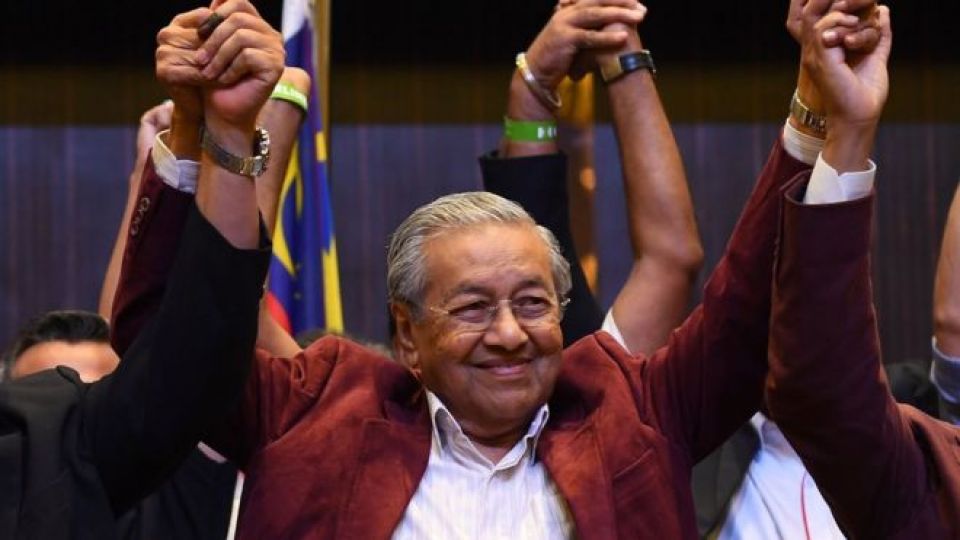April 9, 2019
The Southeast Asian nation had chosen to withdraw from the ICC statute.
As debate rages on over Malaysia’s decision not to accede to the founding treaty of the International Criminal Court (ICC), a small group demonstrated outside the Malaysian parliament on Monday (April 8) to demand the removal of Foreign Minister Saifuddin Abdullah and Attorney-General Tommy Thomas.
This comes as four local academics were reported to have presented a ‘secret’ paper to the Conference of Rulers this month to convince them to reject the Rome Statute, warning that the international treaty could cause the Malaysian King to lose his immunity to the international court.
The debate over the Rome Statute heated up after Prime Minister Mahathir Mohamad said last Friday (April 5) that his government isn’t acceding to the treaty, though it had earlier indicated it would do so.
But the U-turn was cheered by Malay groups, along with opposition parties Umno and Parti Islam SeMalaysia. They contended that the Malay constitutional monarchs would lose their immunity, while Islam’s role would be diluted should the country becomes a party to the Rome Statute.
Under the Statute, the ICC is able to probe and prosecute in situations where states are “unable” or “unwilling” to do so themselves on four specific major crimes.
The ICC is the first permanent, treaty-based international criminal court, and its powers are limited to only four crimes – genocide, war crimes, crimes against humanity and crimes of aggression.
Dubbed the “court of last resort”, the ICC prosecutes only individuals, not groups or countries.
As of March 18, 122 countries were party to the Rome Statute. Some countries that have not acceded to the statute include the United States, China, Russia and India.
Foreign Minister Saifuddin said over the weekend that the government’s U-turn was a political move made to avoid a “coup attempt”.
He said the issue could be “manipulated to the extent that people go to the streets, moved by the ‘deep state’ and certain apparatus”.
A group of about 40 Malay men and women demonstrated outside Parliament on Monday, demanding the resignations of Mr Saifuddin and Mr Thomas for earlier agreeing to accede to the treaty.
Meanwhile, Malaysiakini news reported over the weekend that a group of student activists released a summary of a paper by four academics in which they claimed was used to convince the Conference of Rulers to reject the Rome Statute.
The conference groups the nine Malay hereditary rulers along with the four state governors.
“The arguments in the paper were very biased as they only discussed why the Conference of Rulers should reject the Rome Statute,” the group said, as quoted by Malaysiakini.
According to the leaked paper, it was presented on April 2 by Universiti Teknologi Mara law professor Rahmat Mohamad, International Islamic University Malaysia law professor Shamrahayu Abdul Aziz and Universiti Sains Islam Malaysia law lecturers, Fareed Mohd Hassan and Hisham Hanapi.
The students said the academics should have presented both the positives and negatives of the Rome Statute.
Two of the academics, when contacted by The Star newspaper did not wish to comment.
“I reserve my comment at the moment,” USIM law lecturer Dr Fareed told The Star on Monday (April 8).
On Sunday (April 7), IIUM’s Assoc Prof Dr Shamrahayu when asked about the authenticity of the paper, said: “You should ask the person who uploaded it.”
Dr Mahathir said last Friday the government withdrew from the Rome Statute “not because we are against it, but because of the political confusion about what it entails, caused by people with vested interests”.
An aide to Dr Mahathir, Kadir A. Jasin, wrote on his personal blog on Monday to remind Malaysians that the Agong (King) and state rulers that they are not immune and could be prosecuted for crimes under local laws.
“It must always be remembered that constitutional monarchs are governed by the law of the land, in which the Constitution is supreme.
“Nobody, not even the monarchs, is above the law.
“The King and state rulers are immune to legal action only in the performance of their prescribed official duties,” wrote Datuk Kadir, the prime minister’s special adviser on media and communications.


